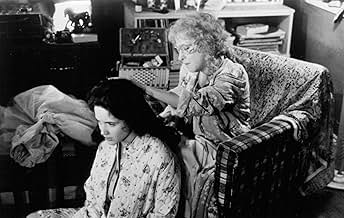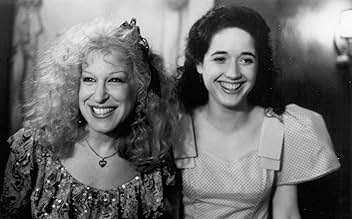VALUTAZIONE IMDb
6,1/10
2973
LA TUA VALUTAZIONE
Aggiungi una trama nella tua linguaChronicling a strong, but eccentric woman's devoted relationship to her daughter through the years.Chronicling a strong, but eccentric woman's devoted relationship to her daughter through the years.Chronicling a strong, but eccentric woman's devoted relationship to her daughter through the years.
- Regia
- Sceneggiatura
- Star
- Premi
- 2 candidature totali
Recensioni in evidenza
10eddax
This is the weepy that Beaches never was. As much as I wanted to love Beaches, it always seemed too hurried for me to "feel" for it (its soundtrack is one of my favorite albums though). Stella, on the other hand, moves at a slower (and occasionally too slow) pace and though it's somewhat manipulative in its tears-inducing tale about a self-sacrificial mother, it works because Bette and the rest of the cast turn in great performances. 10/10
The "Stanwyck version" is not, as other reviewers seems to believe, the "orginal" and to my mind the performance in the genuinely original (1925) version by Belle Bennett is quite the best. The problems with Midler's performance have been well rehearsed but there are serious problems too with Stanwyck's performance. The 1937 version tracks the original almost exactly (the only real difference obviously being sound)losing some significant detail but without really improving it in any way. Stanwyck is miscast. Her "vulgarity" comes and goes in a totally illogical manner and when she suddenly converts herself for no obvious reason into some sort of clown towards the end of the film, it doesn't really make any sense. Bennett's performance builds the character much more consistently and convincingly. The daughter too is far less saccharine and far more believable than in the 1937 version. The original is also far more frank in confronting the class issue which is somewhat air-brushed in the 1937 version. Arguably Midler returns to something closer to the original but I do not think her performance as good as Bennett's.
I think it was Ebert who gave Stella four out of four stars but, other than his, I have never read a positive review of this sadly misunderstood drama about class divisions, love, and sacrifice (three themes most great romantic stories or films have in common).
Here the major theme is class division. Stella is a story from depression era America. That said, it was translated to the screen then in such a memorable fashion that this remake (if you ask a Stanwyck fan or two) was not exactly appreciated. Fans of the original never gave it a chance. Furthermore, this version of Stella was made in the 1990s, not exactly a time of great financial trouble in America (as the depression was).
Now is the time to remove the rosy-coloured glasses, in the midst of a new era of recession and poverty in America, and see that this powerful story still rings true, is as timely and relevant as ever, in its updated format.
Yes, class divide is the major theme here. Stella is among the working poor, single, with big dreams but little hope of realizing those dreams. She works in a bar, doesn't have much money, lives in a crummy apartment. You get the drift. In the morning, she doesn't really want to get out of bed. On her wall, pictures of movie stars she idolizes.
A man sees her dance at the bar. He's wealthy, educated, from one of those upper class families that has nothing in common with Stella's. His major concern is what ivy league college to attend, her's is how to pay the rent, how to be 'happy.' They have an affair. They like each other. Stella ends up pregnant. Stella tells the guy the news. His response? "How about an abortion?" She replies, "I just wanted a room full of balloons." He supplies the balloons, and the proposal, but she sees his heart is not in it, and has too much pride to accept. She sends him packing.
Her daughter is eventually torn between the two lifestyles--the love she has for her mom and the advantages and happiness and love held out to her by her wealthy father. Stella, alone and unloved, and not wanting her daughter to become as unhappy as her someday, makes the ultimate sacrifice. She gives up the only love and happiness she has ever known to ensure the happiness of her daughter, and perhaps live vicariously, and with hope, knowing that at least her daughter found something to live for.
Now, for the movie. Everything is right about it. Beautiful score, artful cinematography, great set design (contrast between the two lifestyles; the messy apt. and the decorated mansions), wonderful and heartfelt performances by the whole cast, with Bette Midler, in particular, Oscar-worthy.
This is a film which is much more significant and well-made than you've been led to believe.
Here the major theme is class division. Stella is a story from depression era America. That said, it was translated to the screen then in such a memorable fashion that this remake (if you ask a Stanwyck fan or two) was not exactly appreciated. Fans of the original never gave it a chance. Furthermore, this version of Stella was made in the 1990s, not exactly a time of great financial trouble in America (as the depression was).
Now is the time to remove the rosy-coloured glasses, in the midst of a new era of recession and poverty in America, and see that this powerful story still rings true, is as timely and relevant as ever, in its updated format.
Yes, class divide is the major theme here. Stella is among the working poor, single, with big dreams but little hope of realizing those dreams. She works in a bar, doesn't have much money, lives in a crummy apartment. You get the drift. In the morning, she doesn't really want to get out of bed. On her wall, pictures of movie stars she idolizes.
A man sees her dance at the bar. He's wealthy, educated, from one of those upper class families that has nothing in common with Stella's. His major concern is what ivy league college to attend, her's is how to pay the rent, how to be 'happy.' They have an affair. They like each other. Stella ends up pregnant. Stella tells the guy the news. His response? "How about an abortion?" She replies, "I just wanted a room full of balloons." He supplies the balloons, and the proposal, but she sees his heart is not in it, and has too much pride to accept. She sends him packing.
Her daughter is eventually torn between the two lifestyles--the love she has for her mom and the advantages and happiness and love held out to her by her wealthy father. Stella, alone and unloved, and not wanting her daughter to become as unhappy as her someday, makes the ultimate sacrifice. She gives up the only love and happiness she has ever known to ensure the happiness of her daughter, and perhaps live vicariously, and with hope, knowing that at least her daughter found something to live for.
Now, for the movie. Everything is right about it. Beautiful score, artful cinematography, great set design (contrast between the two lifestyles; the messy apt. and the decorated mansions), wonderful and heartfelt performances by the whole cast, with Bette Midler, in particular, Oscar-worthy.
This is a film which is much more significant and well-made than you've been led to believe.
I can sympathise with Bette Midler's desire to extend her range, especially following her personal triumph in "Beaches". Throughout "Stella" she bears evidence of a thinking, intelligent actress, and she has my profound admiration for that. But good intentions do not make for a good movie, nor indeed for a good performance. As the redoubtable Stella Dallas - so memorably played by Barbara Stanwyck in 1937 - Midler gives an hysterically over detailed performance. Straining pathetically for heart throbs, she makes herself look more than a little ridiculous - and for a woman who started her career singing in a gay bath house, that's saying something.
But whilst I can't see the film as more than the standard mother-love soap opera, its good to see an actress daring to hang herself in public. Her performance doesn't really work, but the effort in itself is fascinating, and at times she comes so close to making us believe in the film.
With a stronger director and a better script this might have been something special. But Midler has had to carry it alone, and that's simply no way to treat the Divine one.
But whilst I can't see the film as more than the standard mother-love soap opera, its good to see an actress daring to hang herself in public. Her performance doesn't really work, but the effort in itself is fascinating, and at times she comes so close to making us believe in the film.
With a stronger director and a better script this might have been something special. But Midler has had to carry it alone, and that's simply no way to treat the Divine one.
This is one where some terrific performances are trapped in a movie that, as a whole, doesn't quite work.
Bette Midler shines as Stella, a working-class high school dropout who slings drinks in an Upstate New York bar. She meets a rich college boy (Stephen Collins) who's taken with her quirky zest for life and they have a kid. But marriage is out of the question. Stella knows in her heart she'd never fit into his world. As the kid grows up, Stella wrestles with what's best for the kid versus what she wants for herself. This quandary eventually leads to a mother's sacrifice.
Based on the 1923 novel STELLA DALLAS by Olive Higgins Prouty, this story was first filmed in 1925 with Belle Bennett and again in 1937 with Barbara Stanwyck as the star. By 1990 the story just seemed far-fetched and very old-fashioned and Midler's follow-up to the smash hit BEACHES was a box-office disappointment.
It's a shame because Midler gives a terrific performance. Her Stella is full of love and self-doubt as she rides the highs and lows of her threadbare life. She eventually ends up selling cosmetics door to door to pay for things for her daughter (Trini Alvarado). Stella puts her life on hold to give her daughter what she thinks the daughter wants. Only problem is the daughter wants something else.
Also very good in this film are John Goodman as Ed, Stella's longtime friend who's on a downward spiral, and Marsha Mason as the warm and understanding Janice, the woman who will become the daughter's step-mother.
Others in the cast include Ben Stiller, Linda Hart, Eileen Brennan, and William McNamara ... but watch this one for a great performance by Bette Midler.
Bette Midler shines as Stella, a working-class high school dropout who slings drinks in an Upstate New York bar. She meets a rich college boy (Stephen Collins) who's taken with her quirky zest for life and they have a kid. But marriage is out of the question. Stella knows in her heart she'd never fit into his world. As the kid grows up, Stella wrestles with what's best for the kid versus what she wants for herself. This quandary eventually leads to a mother's sacrifice.
Based on the 1923 novel STELLA DALLAS by Olive Higgins Prouty, this story was first filmed in 1925 with Belle Bennett and again in 1937 with Barbara Stanwyck as the star. By 1990 the story just seemed far-fetched and very old-fashioned and Midler's follow-up to the smash hit BEACHES was a box-office disappointment.
It's a shame because Midler gives a terrific performance. Her Stella is full of love and self-doubt as she rides the highs and lows of her threadbare life. She eventually ends up selling cosmetics door to door to pay for things for her daughter (Trini Alvarado). Stella puts her life on hold to give her daughter what she thinks the daughter wants. Only problem is the daughter wants something else.
Also very good in this film are John Goodman as Ed, Stella's longtime friend who's on a downward spiral, and Marsha Mason as the warm and understanding Janice, the woman who will become the daughter's step-mother.
Others in the cast include Ben Stiller, Linda Hart, Eileen Brennan, and William McNamara ... but watch this one for a great performance by Bette Midler.
Lo sapevi?
- QuizThe DVD jacket shows Bette Midler images when she played CC Bloom from the 1988 film "Beaches."
- BlooperWhen Ed leaves Stella's in a huff on Christmas Eve, he slams the front door and the wreath falls off. However, when Stella says goodbye to Jenny, the wreath is hanging up again.
- Citazioni
Stella Claire: I read them women's magazines, you know? The ones that tell you how to get a better life. They say, "Go in a new direction." I wanna say, "Where's the door? I'll go but where's the goddamn door?"
I più visti
Accedi per valutare e creare un elenco di titoli salvati per ottenere consigli personalizzati
- How long is Stella?Powered by Alexa
Dettagli
Botteghino
- Lordo Stati Uniti e Canada
- 20.240.128 USD
- Fine settimana di apertura Stati Uniti e Canada
- 4.311.656 USD
- 4 feb 1990
- Lordo in tutto il mondo
- 20.240.128 USD
- Tempo di esecuzione1 ora 49 minuti
- Colore
- Mix di suoni
- Proporzioni
- 1.85 : 1
Contribuisci a questa pagina
Suggerisci una modifica o aggiungi i contenuti mancanti



































